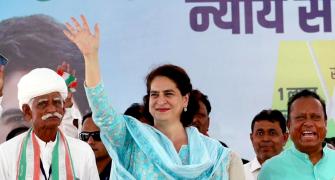'There are multiple ups and downs. You should be able to withstand all that.'
'You need to have the temperament to run a marathon.'

Krishnan Ganesh is one of India's most successful serial entrepreneurs, whose name is synonymous with TutorVista, Big Basket, Bluestone.com, etc.
After his stint as a serial entrepreneur building four successful ventures, he founded GrowthStory.in, a venture builder platform.
"Always look forward. Whether it is clean mobility or AI or Machine Learning, the world today is very different from what it was 5 or 10 years back. Look forward and see how you can leverage the entire ecosystem to build new businesses. In fact, the ecosystem is almost conspiring to help you succeed," Ganesh tells Rediff.com's Shobha Warrier.
The concluding segment of a two-part interview:
- Part 1 of the Interview: 'I am addicted to entrepreneurship'
You said, as a venture builder you first find out where the opportunities are, and then do the market research.
Which are the fields that you find attractive now?
Currently, there is a huge amount of opportunities in the business models built out of generative AI and machine learning.
Then the entire D-tech area whether it is automation or things involving IoT.
Also, all the Clean Mobility initiatives like the entire ecosystem around electric vehicles like battery technology, charging, etc look very promising.
I don't think we have not even scratched the surface in any of these areas. Opportunities in all the business models built around these technologies, are huge.
What is important is, how to build commercial, viable business models.
This is about the technology side of businesses.
On the market side, we have huge challenges in India in equity in healthcare and education for the masses.
The question is, how do we use all the technology I talked about to build commercially viable business models for the masses so that you can remove the inequity in society.
One of the interesting initiatives I am working on now is a not- for- profit Bahaar Foundation. We work in the healthcare and agriculture sectors creating microentrepreneurs especially in the rural areas.
Of course, this is a not-for-profit model, and not a commercial model.

You said you approach both experienced and first time entrepreneurs when you have an idea. What do you look for in an entrepreneur?
Every business model requires the Right to Win approach. So, what I look for in an entrepreneur is, whether he has this Right to Win attitude.
What I look for next is, whether they are long-term entrepreneurs or opportunistic entrepreneurs. Many people want to be entrepreneurs today for the glamour and money in entrepreneurship.
Entrepreneurship is not a sprint; it is a marathon with multiple ups and downs. And you should be able to withstand all that. You need to have the temperament to run a marathon.
Remember, in the model that I follow now is where I don't run the business; the entrepreneurs run it.
I help, I support, but ultimately, they have to run the business.
When I looked for an entrepreneur for Bluestone.com, I had in my mind was one who can disrupt the traditional jewellery market with technology.
You may wonder what Gaurav Singh Kushwaha, an IIT-Delhi computer science graduate, is doing in jewellery business when he is not a jeweller.
It was his ability to design jewellery with the aid of computers and deliver exactly the same thing that attracted me. There is a lot of technology involved in the business.
So, the right person with the Right to Win approach has to come from a person who has the ability to use technology in designing.
Similarly, the founder of Homelane is Srikanth Iyer was my co-founder in TutorVista. So, there is familiarity in the way we work.
What advice will you give to young entrepreneurs?
-
Always look forward. Whether it is clean mobility or AI or Machine Learning, the world today is very different from what it was 5 or 10 years back. That's why the first advice I give is, look forward and see how you can leverage the entire ecosystem to build new businesses. In fact, I would say the ecosystem is almost conspiring to help you succeed.
When we started, we didn't have the ecosystem of venture capitalists or mentors or angel investors or accelerators. None of this existed then.
-
Whether it is IoT or Machine learning or AI, the access is democratised. When we started, we had to be from a business family. Then there was this license raj. Today, the opportunities are democratised.
So, use the ecosystem and the democratised opportunities and find out where it is headed in the next 10 years.
-
Take risks. Today, the cost of risk is very low. When I graduated, the first attraction was a government job and the next was a job in a large company like the Tatas or the Birlas.
But today, there are a lot more opportunities, and the cost of failure is low.
So, take risk and be an entrepreneur. Don't settle for a 9-5 or 9-6 job.
- See how you can make a difference to the world by solving problems. Especially in India, we are facing humongous problems. This is a great opportunity for an entrepreneur. If you can solve a big problem, you can build a large business and make a lot of money.
How much has the entrepreneurial scene in India changed from the time you became an entrepreneur?
How conducive is it for an entrepreneur now?
The ecosystem has matured so much that in every aspect, we have reached great heights from the time I started 33 years back.
- Ease of doing business has improved.
- The license raj has come down.
- You have a support system of mentors, angel investors, venture capitalists, accelerators, advisors, etc today.
- The government initiatives like Start-up India, Digital Mission, etc have put start-ups in the forefront. I am not talking politics when I say till 10 years ago, no prime minister or the government official spoke of start-ups.
- The social stigma associated with fear of failure has gone thanks to the media glamorising fund raising, entrepreneurship, etc.
-
The cost of starting a business has reduced significantly now as basic infrastructure is available today. I had to buy a server, I had to buy an office space, I had to give the security deposit.. I had to do everything before I started a business.
Today, you can sit in Chennai and I can sit in the US and we can start a company together on the cloud!
On the negative side, we still have a long way to go to become start-up friendly like some other countries.
The taxation for companies or tax terrorism, the notices you get are still bad.
Closing down a business is a horror story. You get tax notices for a business that is not operational for 5 years.
So, there is a lot more to be done in ease of doing business, and also shutting down a business.
But I am optimistic about the future!
Feature Presentation: Aslam Hunani/Rediff.com









